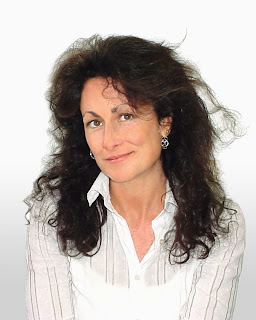 Christine Wiesenthal
Christine Wiesenthal is a
poet,
biographer, and literary critic whose most recent books include
Instruments of Surrender (
BuschekBooks, 2001) and
The Half-Lives of Pat Lowther (UTP, 2005). Her poetry has appeared in numerous literary magazines including
Fiddlehead,
Geist and
In Fine Form: Canadian Form Poetry (eds.
Kate Braid and Sandy Shreve), and she has also contributed interviews to collections such as
Tim Bowling's Where the Words Come From: Canadian Poets in Conversation (with
P.K. Page).
Instruments of Surrender was shortlisted for the
Stephan G. Stephannson and
Gerald Lampert Poetry Awards in 2001 and 2002;
The Half-Lives of Pat Lowther was awarded the
Canadian Historical Association's Clio Prize for British Columbia in 2005, and shortlisted for the 2006 Governor General's Literary Award for Nonfiction.
1 - How did your first book change your life?
My first book was a critical monograph, on representations of madness in nineteenth-century literature. I think what it did, in effect, was give me "permission" to turn back to the creative writing I'd put on hold while working on my academic degrees. Suddenly I discovered a lot of pent-up creative energy -- and so my next book was a collection of poems.
2 - How long have you lived in Edmonton, and how does geography, if at all, impact on your writing? Does race or gender make any impact on your work?
As for the impact of geography, yes, that's there in both my poetry and nonfiction -- the badlands, the prairies,
Lake Winnipeg, local flora and fauna in my poems; the West Coast in my
biography of Pat Lowther -- whose physical world also figured sensuously in her writing. But I think
Charles Wright says it best in one of his poems from
Scar Tissue, "The Minor Art of Self-Defense": "Landscape was never a subject matter, it was a technique/ a method of measure/ a scaffold for structuring." I'm intrigued by that idea of landscape as a "scaffold for structuring" some other understory about experience and language.
And lived experience is always inflected by aspects of identity such as gender, race, ethnicity, age, religion, etc., isn't it? I grew up in the seventies when sexual double standards were still pretty obnoxiously obvious and enforced. (Which is not to say they don't still exist today.) Poems like "The Laundry Cycle" from
Instruments of Surrender recalland question that whole adolescent experience of being trained in the "arts" of domestic femininity, and of gender roles more generally.
Pat Lowther was also a feminist poet, and gender politics are a central theme of that book,
The Half-Lives of Pat Lowther, as well.
3 - Where does a poem usually begin for you? Are you an author of short pieces that end up combining into a larger project, or are you working on a "book" from the very beginning?For me, a poem usually starts as a resonant line, phrase, or image. It sticks with me as an insistent sort of wish -- to exfoliate or grow into something fuller, awhole poem, a complete emotion/image complex, a larger "scaffold" to recall
Wright. Sometimes that development happens right away; sometimes I have to leave my fragments lie about for a year or more before I can hear or see what they want to yield, if anything. Concept poems -- "hey, why don't you write a poem about X or Y" -- rarely work for me.
My process is similarly inductive for larger projects. Start with small pieces that at some point group or gather into constellations that suggest a larger picture. This is true for my nonfiction as well as poetry. I mean, I knew that I intended to write a whole book on
Pat Lowther when I started, but it wasn't until I had done a lot of gathering and fiddling with little pieces of the puzzle --until I hit upon a central organizing metaphor for the book -- that I knew HOW it could work as a book. I remember the moment that idea came to me. We were driving across the
High Level Bridge, on our way to
Audrey's Books to hear
Fred Stenson read from
The Trade. I said to my husband, hey, what about this idea of the half-life? He heard me out, then said, "I think you're onto something. Go for it." So good to have a patient and trustworthy sounding board at exactly the minute you need to try and articulate some inchoate flashes of thought!
4 - Are public readings part of or counter to your creative process?Depends on whether those readings are mine or not! Good readings by other authors are a cherished part of my process -- nothing more stimulating than hearing work that impresses/moves/stuns you. Readings like that often make me want to go right home and start writing. And often I do, if only journal entries on the reading event I've just attended.
My own readings, on the other hand, are somewhat counter -- if not to my process, then certainly to the inclination of my personality. Though I teach for a living, which obviously involves routine public performance, I am at heart a pretty shy introvert. I like writing my work much more than reading my work in public. That said, I can't say I've ever regretted any reading I've agreed to do. They've often proven a lot more fun and rewarding in the end than I'm willing to imagine beforehand. (Guess that makes me a pessimist, too.)
5 - Do you have any theoretical concerns behind your writing? What kinds of questions are you trying to answer with your work? What do you even think the current questions are?
[I would have to write a dissertation if I tried to answerthis one, so I'm going to skip it!]
6 - Do you find the process of working with an outside editor difficult or essential (or both)?
Depends on the editor, the level of difficulty, I suppose, but I'd have to say it's an essential part of the process, even when work has been workshopped prior to publication. Getting someone else's fresh eyes/ears to inhabit your work is invaluable, even when the feedback may be unwelcome. It forces you to go back and figure out what you're ready to change, or not, and why. I find that can be the most taxing phase of writing, though: you're already exhausted from having written a book, and then you have to have another go at it.... sometimes you feel like you never want to see the damn thing again by the time it's all over.
7 - After having published a couple of titles over the past few years, do you find the process of book-making harder or easier?
Harder. Because who wants to write the same book, or even poem, twice? And I don't know why, but it seems to take more and more extreme measures and efforts to clear out and protect time for research/writing -- perhaps a symptom of of our 24/7 wired connectivity, in part.
8 - When was the last time you ate a pear?
I am not a fan of the pear. They bruise too easily when ripe, and are woody if you try to eat them before they get that soft. I have the same bias against bananas, which I will only eat if sliced up in fruit salad, and then sparingly. Give me just about any other kind of fruit, though, especially cherries and berries.
9 - What is the best piece of advice you've heard (not necessarily given to you directly)?
The move from poetry to
nonfiction felt smooth for me, perhaps because (and this was part of the appeal), the nonfiction biography project was about a poet and poetry. Good prose can be poetic, anyway. Prose is so capacious: it can handle so many different modes and voices. The move back to poetry now, more recently, has felt tougher, partially because it takes time and energy to tap into that left brain unconscious (or whatever it is) that speaks in a real voice. I think it was
Gary Geddes, when
he gave a reading here recently, who said he'd given up on the lyric form because it was too exhausting: every lyric is a little world re-invented from the ground up. Finding time for sustained writing of my own is my biggest challenge at the moment -- as it usually is for so many of us, right?
11 - What kind of writing routine do you tend to keep, or do you even have one? How does a typical day (for you) begin?I don't really adhere to a writing "routine." I cram it in where and when possible. If I'm really going on something, almost everything else will give way to the writing --first and foremost being sleep, house work, socializing etc. I tend to write at night, but again, if I'm in serious production mode, I can work for long stretches, morning, afternoon, evening, night. Bit compulsive that way, I've been told.
I do, however, adhere to a yoga practice that is more "routine" than my writing life, and any typical day for me begins with
Tibetan Rites, a short series of exercises that get the kinks out and stretch me out a little.
12 - When your writing gets stalled, where do you turn or return for (for lack of a better word) inspiration?
To other writing, books and authors that I admire. And also to my journals, where all the raw material and fragments that would otherwise go forgotten get scribbled down. Sometimes returning to that source material serves as a trigger for new work.
And sometimes I just go for a long walk, or do something physical, like go for a bike ride or (usually) do some yoga. On that note, I don't think "inspiration," the intake of breath, is such a bad word....
13 - How does your most recent book compare to your previous work? How does it feel different?Every one of my books so far has been in a different genre -- critical monograph, poetry, biography. So I'm one of those jacks of all trades, master of none. The biography was unlike anything I'd ever attempted before. Had I known, in fact, how much work it would actually involve, I may not have tried it. It was different in that it involved different sorts of research that stretched me in new ways. I spent a lot of time doing stuff like trying to track people and things down; interviewing people; visiting places that had been important to
Pat or her family; walking around Vancouver endlessly, and usually in the rain, of course. It was a very active and immersing research experience. Evenwhen I took a break and went to the art gallery, say, the things I would be looking at would connect in some way to
Pat's history and world, generating new ideas. The writing of the book also demanded a kind of balancing act between narrative and analysis that I found challenging: how to keep the momentum of a life story going, but also do the work of literary biography and cultural history.
14 - David W. McFadden once said that books come from books, but are there any other forms that influence your work, whether nature, music, science or visual art?All the above, in terms of content or substance. In terms of form, science provided the crucial metaphors for the structure of my biography, especially in
the notion of the half-life. But I also read a lot about theoretical physics for that book, which is really fascinating stuff. It eventually also informed my re-thinking of linear narrative time, chronology, etc.
15 - What other writers or writings are important for your work, or simply your life outside of your work?I was trained as a
Victorian scholar, and I still love to go back and read nineteenth-century literature, including works in translation like the
Tales of E.T.A. Hoffman. I always have some history and biography books on the go --most recently, some histories of Berlin and of Germany after
the fall of the Third Reich. And
Claire Tomalin's most excellent biography of
Samuel Pepys,
a book I was sorry to finish.
And when I need a break from too much text and too much thinking, trash magazines are my favorite little indulgence, the trashier the better.
16 - What would you like to do that you haven't yet done?
At least two projects in two different genres. But I'm too superstitious to commit them to print here: it could jinx them. (See "pessismism," above.)
17 - If you could pick any other occupation to attempt, what would it be? Or, alternately, what do you think you would have ended up doing had you>>not been a writer?
I like to delude myself by thinking it'd be something outdoorsy and tough, like being a park warden or a rancher. (I have a color advertising poster in my writing study with pictures of glorious ranch vistas and the heading, IMAGINE: YOUR OWN RANCH.") The sad reality, though, is that I am too much of a citified wimp to take that sort of work on. Besides which, I have a healthy fear of the wilderness and break out in hives on contact with most animals, horses included. So, so much for my fantasy life. But I do really like being active outside and in rural/natural places, as often as possible -- even if it's just messing around in my back yard or gardens at home.
Either that, or, if I had a scientific bone in my body, a geologistor an archeologist. I have a friend who works as an editor for professional geologists and she says the writing is really boring -- totally technical. But I love rocks and old things, and have this glamorized idea of people who get to head off to remote and lovely places to dig around and do "field work." What fun!
18 - What made you write, as opposed to doing something else?
That's a really good question, because I grew up drawing and sketching almost as much as writing poems and stories and journals. I don't know at what point exactly, or why, I stopped using my sketch book and focussed on writing -- I think it must have been around the time I started university -- my studies were all book and reading oriented. But my partner, Brad, last year bought me a sketch book when my writing got stalled. I think I've been afraid to use it, because it's sitting there almost untouched, except for a few doodles. . .
19 - What was the last great book you read? What was the last great film?
This summer I finally got around to reading
Dante's Inferno. It's
Ciaran Carson's translation, which some people object to for it's anachronistic contemporization of
Dante's language, but which I found playful and inventive. I also have
Pinksy's translation lying around here somewhere; maybe this summer, I'll read that version and compare. What an incredible book. Both terrifying and hilarious in its visionary power. I mean, the precision of the architecture of Hell is incredible! -- Not just the
Nine Circles, but all the ditches, zones and "arrondissments" of each circle, all for separate shades of sinners. And the description of the City of Dis is the stuff of nightmares. Dante would have made one hell of an urban planner, pardon the pun.
As for films, "great" might be stretching it, but the German film,
The Lives of Others, impressed me deeply. It's about the culture of espionage and political paranoia in communist East Germany -- and about the power of perception, especially perceptions of betrayal. It's also about a silent sort of heroism and gratitude that are vastly under-rated in our contemporary Western, especially North American, culture. Maybe this film also resonated for me because of my family history --I had a great aunt, whom I never met, who was caught in East Berlin when the wall went up. Her three sisters had all moved to Western sectors of the city in time, but she lived and died there alone. Although I passed through East Berlin and communist East Germany several times as a teenager and young woman, I had no real sense of what it might be like to live there, based on those visits, or the rumors swapped by my relatives in West Germany. It wasn't exactly a place Westerners dallied or got off the beaten path. It just struck me as incredibly dreary and depressing: grey and run down. Also scary. The border guards and inspections at places like
Checkpoint Charlie were really unnerving at times.
20 - What are you currently working on?I'm currently working on some poems, and an editing project -- an edition of
Pat Lowther's poetry. That'll be a new challenge, and I'm looking forward to getting back to work on that project again later this spring.



 We don't know why Joel looks like this; something about sitting at the bar?
We don't know why Joel looks like this; something about sitting at the bar? Jenna Butler, just starting to read some of her prairie poems, perfectly timed for Winnipeg poet/critic Dennis Cooley's arrival.
Jenna Butler, just starting to read some of her prairie poems, perfectly timed for Winnipeg poet/critic Dennis Cooley's arrival. Jenna Butler and her husband looking adorable. She will also be reading at the upcoming Edmonton John Newlove launch/screening.
Jenna Butler and her husband looking adorable. She will also be reading at the upcoming Edmonton John Newlove launch/screening. Thomas Wharton [see his 12 or 20 questions here] gritting his teeth for some reason; he read a magnificent non-fiction piece about bears.
Thomas Wharton [see his 12 or 20 questions here] gritting his teeth for some reason; he read a magnificent non-fiction piece about bears. We don't know who this guy is, or why Lainna took his photo; he was "hanging around" by the payphone upstairs as we were leaving the reading. Is that creepy or what?
We don't know who this guy is, or why Lainna took his photo; he was "hanging around" by the payphone upstairs as we were leaving the reading. Is that creepy or what? Thomas Wharton and Christine Stewart (who reads in Calgary this week with Lisa Robertson); Lainna suggested "twins separated at birth," perhaps.
Thomas Wharton and Christine Stewart (who reads in Calgary this week with Lisa Robertson); Lainna suggested "twins separated at birth," perhaps. Heather MacLeod and unknown; I mean, she's known, I've only met her half a dozen times, but why can't I remember people's names?
Heather MacLeod and unknown; I mean, she's known, I've only met her half a dozen times, but why can't I remember people's names? Christine Stewart [see her 12 or 20 here] listening to something that Trisia Eddy is saying.
Christine Stewart [see her 12 or 20 here] listening to something that Trisia Eddy is saying. Christine Stewart (again) and Trisia Eddy (again).
Christine Stewart (again) and Trisia Eddy (again). Winnipeg poet/critic Dennis Cooley [see his 12 or 20 here] and Edmonton poet/critic Douglas Barbour [see his 12 or 20 here]; Cooley had actually read earlier in the afternoon at the University of Alberta, and was nice enough to come by the reading to hang around.
Winnipeg poet/critic Dennis Cooley [see his 12 or 20 here] and Edmonton poet/critic Douglas Barbour [see his 12 or 20 here]; Cooley had actually read earlier in the afternoon at the University of Alberta, and was nice enough to come by the reading to hang around.
 Some of the crowd; note
Some of the crowd; note 
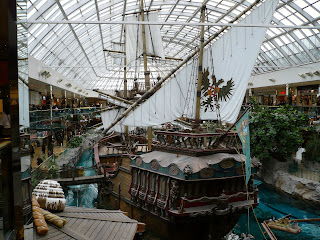
 Christine Wiesenthal
Christine Wiesenthal 


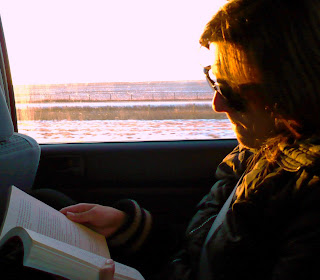
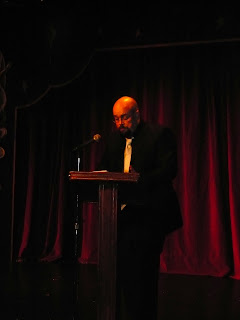

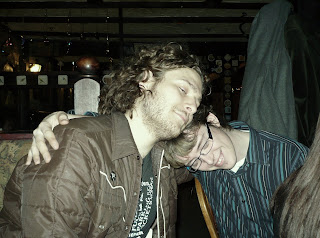
 a very lovely photo of
a very lovely photo of 


 Makyee Mak and
Makyee Mak and 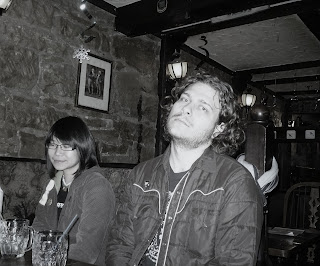 group photo at the pub post-reading, with myself,
group photo at the pub post-reading, with myself,  Also, a few photos from that December Olive reading at
Also, a few photos from that December Olive reading at 

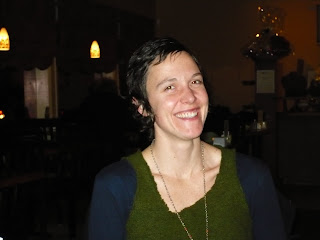 And finally,
And finally, 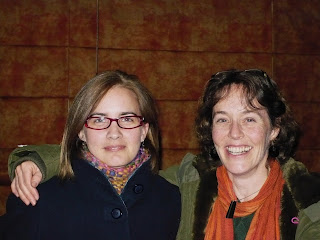 It makes me wonder what I will do once I finally have to leave this place? It makes me envious, somewhat, that
It makes me wonder what I will do once I finally have to leave this place? It makes me envious, somewhat, that